|
|
|
Sort Order |
|
|
|
Items / Page
|
|
|
|
|
|
|
| Srl | Item |
| 1 |
ID:
133459
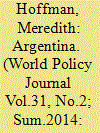

|
|
|
|
|
| Publication |
2014.
|
| Summary/Abstract |
When the peso hit rock bottom in January, Ande Wanderer rang up her money dealer-a former official in Argentina's national government. She'd sold off her stocks, cashed in her American savings, and wired him the money. Now she rushed to his office, a ninth floor room in downtown Buenos Aires. The official exchange rate was 8 pesos to the dollar. But her dealer gave her 11-the black market rate at the time-and kept a small fee for himself. That meant she got some 40 percent more pesos for her U.S. money.
|
|
|
|
|
|
|
|
|
|
|
|
|
|
|
|
| 2 |
ID:
114436
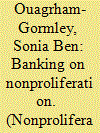

|
|
|
|
|
| Publication |
2012.
|
| Summary/Abstract |
In the past decade, governments have increasingly relied on financial sanctions to counter the proliferation of weapons of mass destruction. By targeting not only individuals and entities involved in illicit activities, but also banks that allow transactions to occur, financial sanctions were expected to stanch the flow of funds that support proliferation and compel compliance with international law-notably by Iran. Ten years later, Iran's nuclear program has advanced, calling into question the effectiveness of financial sanctions. Previous research evaluating the effectiveness of financial sanctions has focused on the impact of sanctions on the targeted country or on the enforcement of sanctions by the international community. Little attention has been devoted to their implementation by banks and government agencies. Based on interviews with US and European bank and government representatives, this article argues that the inefficiency of financial sanctions is due to shortcomings in training and information support from governments to financial institutions; governments on both sides of the Atlantic have provided little or no assistance to enable banks to identify patterns of proliferation financing and implement the sanctions regime. To transform financial sanctions into effective nonproliferation tools, governments need to play a greater role in their implementation.
|
|
|
|
|
|
|
|
|
|
|
|
|
|
|
|
| 3 |
ID:
131122
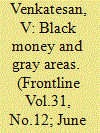

|
|
|
|
|
| Publication |
2014.
|
| Summary/Abstract |
The decision to constitute a special investigation team to investigate cases of black money stashed away in foreign banks will prove to be an acid test for the Narendra Modi government as the fight against the black economy, calls for the strong political will.
|
|
|
|
|
|
|
|
|
|
|
|
|
|
|
|
| 4 |
ID:
137229
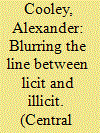

|
|
|
|
|
| Summary/Abstract |
The anti-corruption norm in both scholarship and the policy world has too narrowly focused on the domestic and institutional context of bribe-taking and public corruption. Instead, we argue that corruption in the contemporary global economy requires a multiple set of connected transactions, processes, and relationships that take place within informal transnational networks that blur the line between illegal and legal activities. These networks include multinational companies, elites in host countries, offshore financial vehicles and conduits, middlemen and brokers, and destination financial institutions. We examine how these actors operate in Central Asia, a region that is widely identified as corrupt, yet is rarely understood as embedded in the types of global processes, offshore connections and transnational links specified in our analysis. Examples of offshore centers in tax planning from Central Asia, and partial results from a field experiment based on impersonating high corruption risks from four Central Asian states, provide evidence for how the various actors in transnational financial networks structure their dealings. We then present two brief illustrative cases of how these transnational networks have operated in energy explorations services in Kazakhstan and telecommunications contracts in Uzbekistan. Our findings have theoretical, practical, and normative implications for scholars and practitioners of Central Asian international political economy and other ‘high risk' regions.
|
|
|
|
|
|
|
|
|
|
|
|
|
|
|
|
| 5 |
ID:
091315
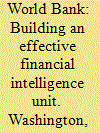

|
|
|
|
|
| Publication |
Washington, DC, World Bank, 2009.
|
| Description |
iv, 83p.
|
| Series |
Combating money laundering and the financing of terrorism: a comprehensive training guide no. 4
|
| Standard Number |
9780821375693
|
|
|
|
|
|
|
|
|
|
|
|
Copies: C:1/I:0,R:0,Q:0
Circulation
| Accession# | Call# | Current Location | Status | Policy | Location |
| 054404 | 332.10684/WOR;4 054404 | Main | On Shelf | General | |
|
|
|
|
| 6 |
ID:
022038
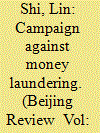

|
|
|
|
|
| Publication |
Aug 1, 2002.
|
| Description |
16-19
|
|
|
|
|
|
|
|
|
|
|
|
|
|
|
|
| 7 |
ID:
063017
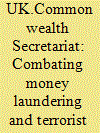

|
|
|
|
|
| Publication |
London, Commonwealth Secretariat, 2005.
|
| Description |
ix, 184p.
|
| Standard Number |
0850928133
|
|
|
|
|
|
|
|
|
|
|
|
Copies: C:1/I:0,R:0,Q:0
Circulation
| Accession# | Call# | Current Location | Status | Policy | Location |
| 049782 | 364.168/COM 049782 | Main | On Shelf | General | |
|
|
|
|
| 8 |
ID:
091313
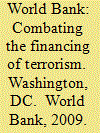

|
|
|
|
|
| Publication |
Washington, DC, World Bank, 2009.
|
| Description |
iv, 94p.
|
| Series |
Combating money laundering and the financing of terrorism: a comprehensive training guide no. 6
|
| Standard Number |
9780821375693
|
|
|
|
|
|
|
|
|
|
|
|
Copies: C:1/I:0,R:0,Q:0
Circulation
| Accession# | Call# | Current Location | Status | Policy | Location |
| 054406 | 332.10684/WOR 054406 | Main | On Shelf | General | |
|
|
|
|
| 9 |
ID:
091316
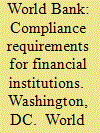

|
|
|
|
|
| Publication |
Washington, DC, World Bank, 2009.
|
| Description |
iv, 84p.
|
| Series |
Combating money laundering and the financing of terrorism: a comprehensive training guide; no. 3b
|
| Standard Number |
9780821375693
|
|
|
|
|
|
|
|
|
|
|
|
Copies: C:1/I:0,R:0,Q:0
Circulation
| Accession# | Call# | Current Location | Status | Policy | Location |
| 054403 | 332.10684/WOR 054403 | Main | On Shelf | General | |
|
|
|
|
| 10 |
ID:
112630
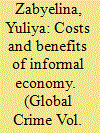

|
|
|
|
|
| Publication |
2012.
|
| Summary/Abstract |
According to IMF and OSCE reports, informal economic transactions in Russia and other states of the former Communist Bloc have cushioned the shocks of economic and political transition of the 1990s by quickly satisfying the consumer demand and providing unofficial jobs to the population faced with transition recession. As these analyses extensively emphasise the advantages of informal entrepreneurship and its positive contribution to stimulating economic growth, this article explores the phenomenon of shuttle trade - a system/form of informal trade outside state control that does not comply with state regulations - as an issue of concern for criminologists. This article investigates the convergence of shuttle trade and criminal activities and the relationship of shuttle trade to the formal regulatory environment. It offers insights into selected criminal activities at Cherkizovsky market in Moscow before its shutdown in 2009 and an evaluation of the policymaking decisions the shutdown triggered.
|
|
|
|
|
|
|
|
|
|
|
|
|
|
|
|
| 11 |
ID:
058450
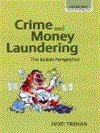

|
|
|
|
|
| Publication |
New Delhi, Oxford University Press, 2004.
|
| Description |
xiii, 253p.
|
| Standard Number |
0195673069
|
|
|
|
|
|
|
|
|
|
|
|
Copies: C:1/I:0,R:0,Q:0
Circulation
| Accession# | Call# | Current Location | Status | Policy | Location |
| 049029 | 364.168/TRE 049029 | Main | On Shelf | General | |
|
|
|
|
| 12 |
ID:
022192
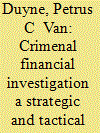

|
|
|
|
|
| Publication |
Spring 1999.
|
| Description |
37-66
|
|
|
|
|
|
|
|
|
|
|
|
|
|
|
|
| 13 |
ID:
059570
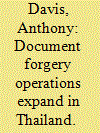

|
|
|
| 14 |
ID:
091312
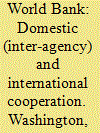

|
|
|
|
|
| Publication |
Washington, DC, World Bank, 2009.
|
| Description |
iv, 55p.
|
| Series |
Combating money laundering and the financing of terrorism: a comprehensive training guide no. 5
|
| Standard Number |
9780821375693
|
|
|
|
|
|
|
|
|
|
|
|
Copies: C:1/I:0,R:0,Q:0
Circulation
| Accession# | Call# | Current Location | Status | Policy | Location |
| 054405 | 332.10684/WOR;5 054405 | Main | On Shelf | General | |
|
|
|
|
| 15 |
ID:
005754
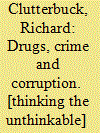

|
|
|
|
|
| Publication |
Houndmills, macmillan Press, 1995.
|
| Description |
xv, 240p.
|
| Standard Number |
0333631013
|
|
|
|
|
|
|
|
|
|
|
|
Copies: C:1/I:0,R:0,Q:0
Circulation
| Accession# | Call# | Current Location | Status | Policy | Location |
| 037139 | 363.45/CLU 037139 | Main | On Shelf | General | |
|
|
|
|
| 16 |
ID:
078086
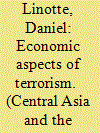

|
|
|
| 17 |
ID:
188041


|
|
|
|
|
| Summary/Abstract |
The past three decades have seen an increase in both domestic terrorist attacks and loans issued by the International Monetary Fund (IMF). In this study, we investigate the connection between IMF loan arrangements and domestic terrorism. We find that countries under IMF loans tend to observe fewer domestic terrorist incidents, especially when the borrowers are democracies. We contend that, while the IMF pressures borrower countries to prevent money laundering and combat the financing of terrorism, this effect is most pronounced in democracies, whose large selectorates incentivize the provision of public goods in a manner that works to reduce domestic terrorism. Our research shows how domestic and international institutions together can possibly help lower incidents of domestic terrorism.
|
|
|
|
|
|
|
|
|
|
|
|
|
|
|
|
| 18 |
ID:
091309
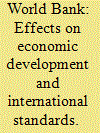

|
|
|
|
|
| Publication |
Washington, DC, World Bank, 2009.
|
| Description |
vi, 62p.
|
| Series |
Combating money laundering and the financing of terrorism: a comprehensive training guide no. 1
|
| Standard Number |
9780821375693
|
|
|
|
|
|
|
|
|
|
|
|
Copies: C:1/I:0,R:0,Q:0
Circulation
| Accession# | Call# | Current Location | Status | Policy | Location |
| 054400 | 322.10684/WOR 054400 | Main | On Shelf | General | |
|
|
|
|
| 19 |
ID:
093865


|
|
|
|
|
| Publication |
2010.
|
| Summary/Abstract |
This article explores the growth of organised crime within the Vietnamese community with particular reference to the cultivation of cannabis, money laundering and the smuggling or trafficking of children. The article begins by exploring the history and diversity of the 'Vietnamese community' in the United Kingdom and the role of Vietnamese culture in shaping their criminal enterprises. It then draws on research involving two sets of qualitative data: one set is based on 45 interviews with law enforcement personnel based in Vietnam and the United Kingdom as well as with key stakeholders in the Vietnamese community; the other set is based on structured questionnaires issued to 34 Vietnamese residents in Britain, 24 of whom are here illegally. It examines the relationship between illegal immigration of Vietnamese citizens to Britain and the urban cultivation of cannabis, in what has become known as 'cannabis factories', and the laundering of the profits abroad to Vietnam. After exposing the logistics of Vietnamese illegal immigration into Britain, the article concludes that those involved in cannabis cultivation, money laundering and people smuggling are primarily motivated by profit rather than 'lifestyle' concerns, and operate within what theorists of organised crime refer to as the 'mono-ethnic criminal network'.
|
|
|
|
|
|
|
|
|
|
|
|
|
|
|
|
| 20 |
ID:
078698
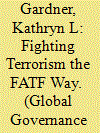

|
|
|
|
|
| Publication |
2007.
|
| Summary/Abstract |
An effective counterterrorist strategy must reflect the adaptive and trans-national nature of terrorism. The challenge presented to lead organizations in the fight against terrorism is assessing threats and understanding terrorist group behavior with the goal to structure and implement an effective transnational response. The fight to capture and shut down terrorist financing requires coordination points, flexibility, and robust commitment by states. The importance of the structure of such a response is central to the question of state compliance. The success of the Financial Action Task Force makes it an ideal case study for effective measures in response to the particular challenges of funding of global terrorism. This article details how the FATF has become adaptive, facilitating transnational effectiveness in the fight to counterterrorist financing and compliance through globally recognized standards, peer review evaluations, and sanctions
|
|
|
|
|
|
|
|
|
|
|
|
|
|
|
|
|
|
|
|
|